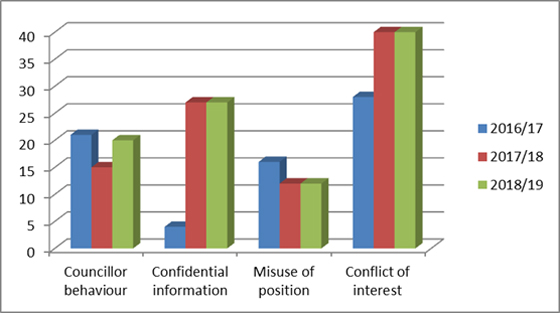Complaints data gained over almost three entire council terms has provided some interesting insights into the conduct of elected councillors. The above graph depicts data over the past three years but compared to the three council terms, it is consistent across those terms.
The Inspectorate identified that conduct-related issues (depicted as 'councillor behaviour' on the above graph) peaked in year three at about 20%, excluding the anomaly of election year complaints in 2016/17.
During the first year in office, data shows many legacy complaints related to councillor conduct during elections and issues such as use of mobile phones or emails for electioneering purposes. In the latter half of the first year, councillors have undergone initial induction training or refresher courses and are dealing with decisions and information related to the council plan, strategic resource plan and budget.
Complaints increase in the second year for various reasons including:
- Personality clashes
- Matters before council
- Political affiliation
- Capability or capacity of elected representatives
- Perceived or actual power imbalance
- Information or actions of administration.
During the third year, complaints are at a peak but intervention mechanisms are starting to take effect, including the councillor code of conduct, informal discussions, and mediation or arbitration.
These are key timings in the cycle that council staff can be aware of and support the addition of periodic training to the calendar and reminders to councillors about the role and their responsibilities to the community.
Chief Municipal Inspector David Wolf said: “We recommend councils implement their own code of conduct procedures and to use this process in the first instance before conduct issues escalate.” “We are aware of many examples where the informal process has had a positive effect. There are also some instances where the conduct has escalated, with the most telling example leading to a council being dismissed.”
Conduct issues were a main cause of the Commission of Inquiry initiated into South Gippsland Shire Council, which recommended in its final report that the council be dismissed.
In a recent example of the councillor conduct panel’s role, a four month suspension was delivered to Frankston councillor Steve Toms for serious breaches of his council’s code of conduct.
Matters related to Councillor Toms had been raised with the Inspectorate but it was assessed that the conduct panel was the appropriate avenue to determine the outcome.
Updated


